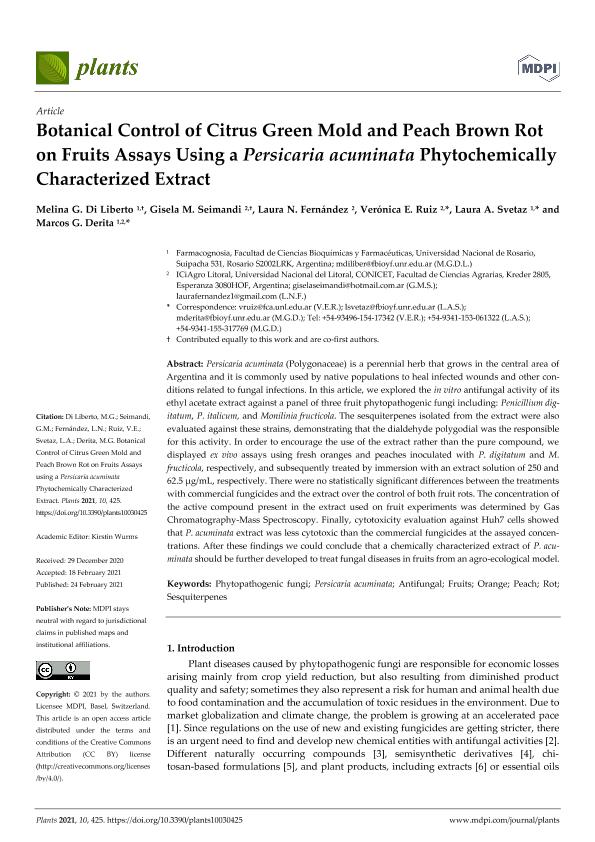Mostrar el registro sencillo del ítem
dc.contributor.author
Di Liberto, Melina Gabriela

dc.contributor.author
Seimandi, Gisela Marisol

dc.contributor.author
Fernandez, Laura Noemí

dc.contributor.author
Ruiz, Verónica Eugenia

dc.contributor.author
Svetaz, Laura Andrea

dc.contributor.author
Derita, Marcos Gabriel

dc.date.available
2022-03-14T11:01:35Z
dc.date.issued
2021-03
dc.identifier.citation
Di Liberto, Melina Gabriela; Seimandi, Gisela Marisol; Fernandez, Laura Noemí; Ruiz, Verónica Eugenia; Svetaz, Laura Andrea; et al.; Botanical control of citrus green mold and peach brown rot on fruits assays using a persicaria acuminata phytochemically characterized extract; MDPI; Plants; 10; 3; 3-2021; 1-14
dc.identifier.uri
http://hdl.handle.net/11336/153308
dc.description.abstract
Persicaria acuminata (Polygonaceae) is a perennial herb that grows in the central area of Argentina and it is commonly used by native populations to heal infected wounds and other conditions related to fungal infections. In this article, we explored the in vitro antifungal activity of its ethyl acetate extract against a panel of three fruit phytopathogenic fungi including: Penicillium digitatum, P. italicum, and Monilinia fructicola. The sesquiterpenes isolated from the extract were also evaluated against these strains, demonstrating that the dialdehyde polygodial was the responsible for this activity. In order to encourage the use of the extract rather than the pure compound, we displayed ex vivo assays using fresh oranges and peaches inoculated with P. digitatum and M. fructicola, respectively, and subsequently treated by immersion with an extract solution of 250 and 62.5 µg/mL, respectively. There were no statistically significant differences between the treatments with commercial fungicides and the extract over the control of both fruit rots. The concentration of the active compound present in the extract used on fruit experiments was determined by Gas Chromatography-Mass Spectroscopy. Finally, cytotoxicity evaluation against Huh7 cells showed that P. acuminata extract was less cytotoxic than the commercial fungicides at the assayed concentrations. After these findings we could conclude that a chemically characterized extract of P. acuminata should be further developed to treat fungal diseases in fruits from an agro-ecological model.
dc.format
application/pdf
dc.language.iso
eng
dc.publisher
MDPI
dc.rights
info:eu-repo/semantics/openAccess
dc.rights.uri
https://creativecommons.org/licenses/by/2.5/ar/
dc.subject
ANTIFUNGAL
dc.subject
FRUITS
dc.subject
ORANGE
dc.subject
PEACH
dc.subject
PERSICARIA ACUMINATA
dc.subject
PHYTOPATHOGENIC FUNGI
dc.subject
ROT
dc.subject
SESQUITERPENES
dc.subject.classification
Agronomía, reproducción y protección de plantas

dc.subject.classification
Agricultura, Silvicultura y Pesca

dc.subject.classification
CIENCIAS AGRÍCOLAS

dc.title
Botanical control of citrus green mold and peach brown rot on fruits assays using a persicaria acuminata phytochemically characterized extract
dc.type
info:eu-repo/semantics/article
dc.type
info:ar-repo/semantics/artículo
dc.type
info:eu-repo/semantics/publishedVersion
dc.date.updated
2022-03-09T18:03:20Z
dc.identifier.eissn
2223-7747
dc.journal.volume
10
dc.journal.number
3
dc.journal.pagination
1-14
dc.journal.pais
Suiza

dc.journal.ciudad
Basilea
dc.description.fil
Fil: Di Liberto, Melina Gabriela. Universidad Nacional de Rosario. Facultad de Ciencias Bioquímicas y Farmacéuticas. Departamento de Química Orgánica. Área Farmacognosia; Argentina. Consejo Nacional de Investigaciones Científicas y Técnicas. Centro Científico Tecnológico Conicet - Rosario; Argentina
dc.description.fil
Fil: Seimandi, Gisela Marisol. Consejo Nacional de Investigaciones Cientificas y Tecnicas. Instituto de Ciencias Agropecuarias del Litoral. - Universidad Nacional del Litoral. Instituto de Ciencias Agropecuarias del Litoral.; Argentina. Universidad Nacional del Litoral. Facultad de Ciencias Agrarias; Argentina
dc.description.fil
Fil: Fernandez, Laura Noemí. Consejo Nacional de Investigaciones Cientificas y Tecnicas. Instituto de Ciencias Agropecuarias del Litoral. - Universidad Nacional del Litoral. Instituto de Ciencias Agropecuarias del Litoral.; Argentina. Universidad Nacional del Litoral. Facultad de Ciencias Agrarias; Argentina
dc.description.fil
Fil: Ruiz, Verónica Eugenia. Consejo Nacional de Investigaciones Cientificas y Tecnicas. Instituto de Ciencias Agropecuarias del Litoral. - Universidad Nacional del Litoral. Instituto de Ciencias Agropecuarias del Litoral.; Argentina. Universidad Nacional del Litoral. Facultad de Ciencias Agrarias; Argentina
dc.description.fil
Fil: Svetaz, Laura Andrea. Consejo Nacional de Investigaciones Científicas y Técnicas. Centro Científico Tecnológico Conicet - Rosario; Argentina. Universidad Nacional de Rosario. Facultad de Ciencias Bioquímicas y Farmacéuticas. Departamento de Química Orgánica. Área Farmacognosia; Argentina
dc.description.fil
Fil: Derita, Marcos Gabriel. Consejo Nacional de Investigaciones Científicas y Técnicas. Centro Científico Tecnológico Conicet - Santa Fe; Argentina. Universidad Nacional de Rosario. Facultad de Ciencias Bioquímicas y Farmacéuticas. Departamento de Química Orgánica. Área Farmacognosia; Argentina. Universidad Nacional del Litoral. Facultad de Ciencias Agrarias; Argentina
dc.journal.title
Plants
dc.relation.alternativeid
info:eu-repo/semantics/altIdentifier/url/https://www.mdpi.com/2223-7747/10/3/425
dc.relation.alternativeid
info:eu-repo/semantics/altIdentifier/doi/https://doi.org/10.3390/plants10030425
Archivos asociados
